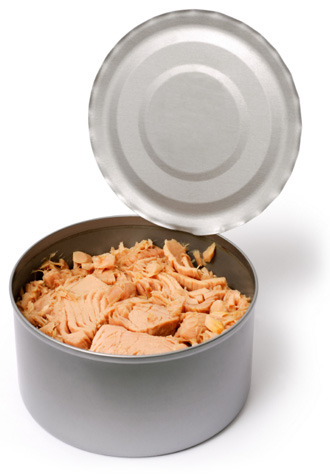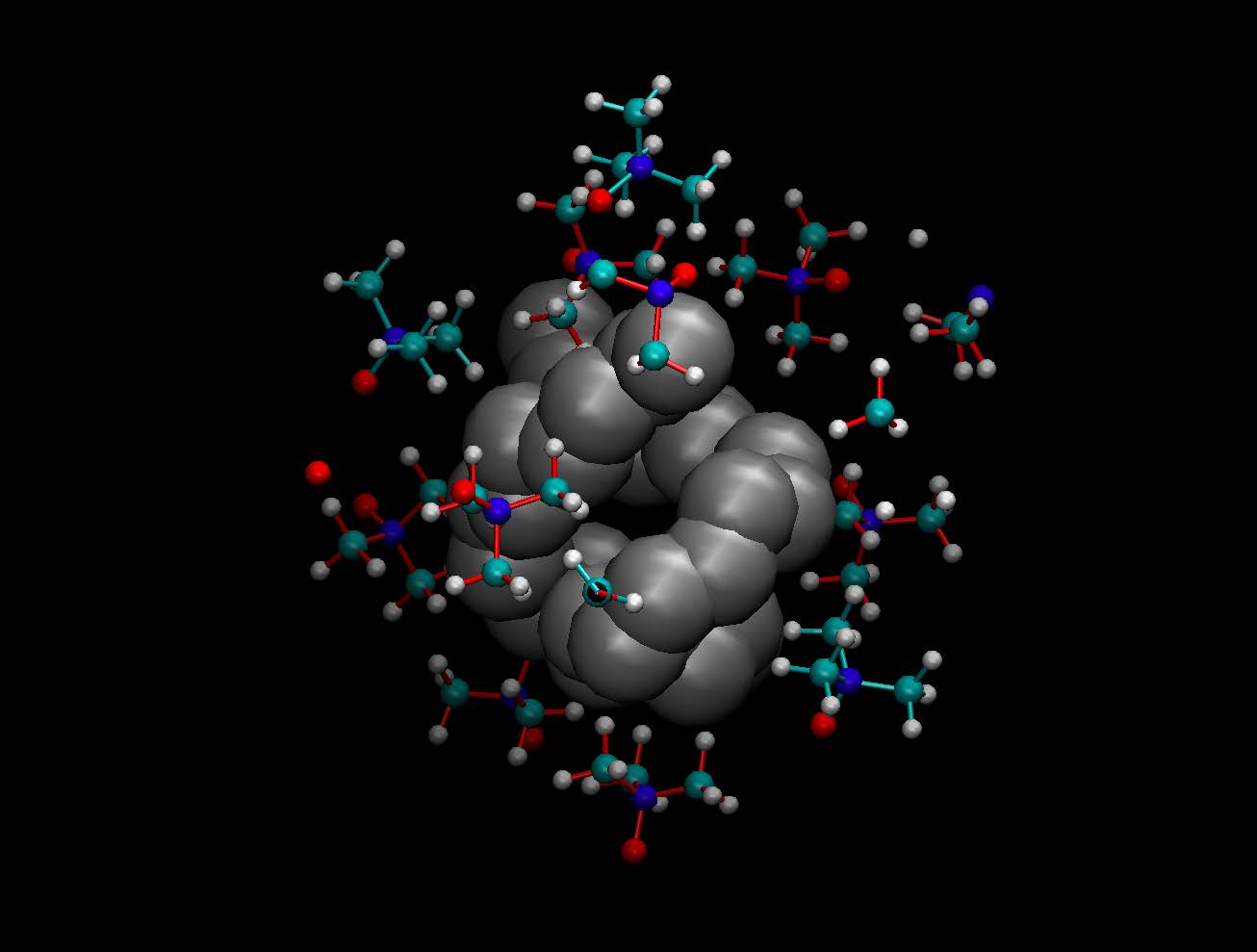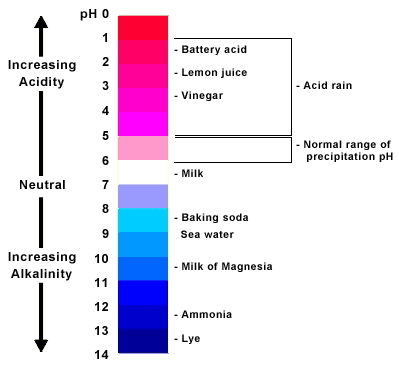With all the activity in the Winter Olympics and the freakish weather everyone's been having this winter, I know what's on everyone's minds. You want to know, what makes fish stink so bad?
That's right, I've got my finger on the pulse.

Tuna, before anything stinky has happened to it.
(Photo from the National Geographic Channel)
A few days ago, I opened a can of tuna fish (a brand I have never bought before) and it was really stinky. Usually a can of tuna has a fishy odor, but this was especially pungent. I rinsed the can-full under tap water for a while -- a practice I have recently developed with tuna, believing that doing so helps make the fish less stinky -- but even after doing that, there was a high level of stinkitude. I made my casserole and everything, washed out the can, washed my dishes. But still, hours later, even the next day, there was a distinct tuna stink coming out of the sink drain. Yeesh.

I'm not mentioning any names, but the brand of tuna that was especially stinky might have been Bumblebee.
(Photo from Root Wellness)
So, why so stinky, tuna?

Shoot. This is too small for you to read it. Some of the fish on this list are snapper, sharks, mackerel, seatrout, bluefish, bonfish, and tuna.
(Poster available for $6 from Roy's Field Guides)

Trimethylamine oxide, or TMAO.
(Image from The Berne Group)

Ammonia and amines are at the bottom of the base/alkaline end. Lemon juice is up near the top. The two together are a match made in heav--well, at least, they result in an unstinky salt.
(Image from the Science Company)

Fish + lemon = happy fish-eating people
(Photo from Dorit Baxter)


Catfish, eating algae. People find a catfish or two to be useful in an aquarium.
(Photo from Aquariums Life)

Tuna with lemon slices and capers -- ooh, that's another good source of acid -- and pappardelle pasta.
(Photo and recipe by Danielle Driscoll at findingsilverpennies.com)
Sources
American Society for Nutrition, What makes fish smell "fishy"?
That's right, I've got my finger on the pulse.

Tuna, before anything stinky has happened to it.
(Photo from the National Geographic Channel)
A few days ago, I opened a can of tuna fish (a brand I have never bought before) and it was really stinky. Usually a can of tuna has a fishy odor, but this was especially pungent. I rinsed the can-full under tap water for a while -- a practice I have recently developed with tuna, believing that doing so helps make the fish less stinky -- but even after doing that, there was a high level of stinkitude. I made my casserole and everything, washed out the can, washed my dishes. But still, hours later, even the next day, there was a distinct tuna stink coming out of the sink drain. Yeesh.

I'm not mentioning any names, but the brand of tuna that was especially stinky might have been Bumblebee.
(Photo from Root Wellness)
So, why so stinky, tuna?
- The answer is a little different depending on whether the fish lives in saltwater or freshwater.
Saltwater Fish

Shoot. This is too small for you to read it. Some of the fish on this list are snapper, sharks, mackerel, seatrout, bluefish, bonfish, and tuna.
(Poster available for $6 from Roy's Field Guides)
- Seawater is about 3% salt. The amount of salt that an animal can withstand in its cells is about 1%. Therefore, fish need to have some special ability to help them survive in an atmosphere that would otherwise kill them with its saltiness.
- Actually, fish have all sorts of mechanisms to handle that extra salt. They have special enzymes in their gills to filter the salt out of their plasma, their kidneys filter out more of the salt that the gill enzymes missed, and then they get rid of still more salt by urinating up to a third of their body weight each day. That's a lot of fish pee in the ocean.
- But they have another special salt-ridding mechanism, a compound called trimethylamine oxide (tri, or 3, + methyl which you know best from methane + amine, which means derived from ammonia), commonly abbreviated as TMAO. (no, not too much information + laughing my ass off, just TMAO.)

Trimethylamine oxide, or TMAO.
(Image from The Berne Group)
- This compound is an osmolyte, which means it helps cells maintain a good balance of fluids. Osmolytes are like sponges, bringing fluid into and out of a cell as it needs more or less water.
- In addition to being sponge-like, TMAO has an extra capability of essentially canceling out the effects of too much urea in a cell. Since fish are trying like mad to get rid of all that salt, and one of the ways they're doing it is by manufacturing insane amounts of urine, they've naturally got a bunch of urea in there. The TMAO helps the fish keep on living even with all that urea inside 'em.
- TMAO is pretty fantastic, if you're a fish.
- Once a fish is killed, however, the TMAO starts to break down. It loses its oxide and it becomes a straight-up amine. And amines, derivatives of ammonia, smell BAD.
- Dead fish actually develop lots of amines, not just the trimethylamine, and those smell bad too: cadaverine (formed when lysine in muscles break down), and putriscine (formed when glutamine in skeletal muscles breaks down). If you recognize the words cadaver and putrid in those amine names, you are on the mark.
- Fortunately for us, there is a solution (hah, chemistry pun). These amines are all basic -- I don't mean that as in "simple," I mean that in terms of their chemical pH.
- To neutralize a base, you add its opposite on the pH scale, or an acid. What's a common acid people keep in their kitchens? Lemon juice! Thus, squirting lemon juice on dead fish turns those stinky amines into salts, and they don't stink anymore!

Ammonia and amines are at the bottom of the base/alkaline end. Lemon juice is up near the top. The two together are a match made in heav--well, at least, they result in an unstinky salt.
(Image from the Science Company)
- Yes, boys and girls, that's why we squirt lemon juice on fish. To de-stink the fish.
- Vinegar or tomato juice, other common kitchen acids, will also work.
- Rinsing the fish in tap water also helps. The water just plain washes off some of the TMA, so there's less of the stinky stuff to smell. So my idea of rinsing the tuna first was not all in my head; it really can help.
- Tuna, by the way, is a saltwater fish.

Fish + lemon = happy fish-eating people
(Photo from Dorit Baxter)
Freshwater Fish

Types of freshwater fish shown here include catfish, bullhead, bass, sunfish, and crappies.
(Poster available for $6 from Roy's Field Guides)
- You're already thinking that, since freshwater fish don't have to have all those special compounds and urinate like crazy to get rid of saltwater, freshwater fish won't stink so bad. You are correct. Mostly.
- It's true, freshwater fish don't have the TMAO to become TMA after they die. But they can have other compounds that are stinky.
- Freshwater fish tend to eat algae. Bottom-feeder fish (e.g., catfish, halibut, carp) especially eat a lot of blue-green algae. This algae gets turned into compounds (geosmin and 2-methylisoborneol) which build up in the muscle tissues of the fish.

Catfish, eating algae. People find a catfish or two to be useful in an aquarium.
(Photo from Aquariums Life)
- These two compounds have very noticeable earthy scents. It's geosmin you're smelling when it first starts to rain and the soil is disturbed. These two compounds often show up together, making a dirty, muddy smell. If your water has a muddy, dirty smell, chances are, it's got both these compounds in it.
- These earthy, dirty-smelling compounds are why most people avoid bottom-feeder fish.
- But these compounds are also bases. Which means adding an acid will neutralize them. Which means, again, lots of lemon juice will help.
- By the way, many people have the idea that a bottom-feeder fish is one that eats poo. This is incorrect. Bottom-feeders skip the poo and eat the algae that grows at the bottom of their environment.
The Upshot
- The fish are just doing what they need to do to get by. They didn't stink until they got killed.
- The things that make them stinky are not harmful -- just rinse and add lemon juice.
- However, if the smell is really overpowering, like, it really smells rotten, that is a sign that the fish has been sitting and decaying for too long. In that case, throw it out.
- But most of the time, add lemon & enjoy.

Tuna with lemon slices and capers -- ooh, that's another good source of acid -- and pappardelle pasta.
(Photo and recipe by Danielle Driscoll at findingsilverpennies.com)
Sources
American Society for Nutrition, What makes fish smell "fishy"?
Everything2.com, Why fish is served with lemon juice
Miami New Times, The Science Behind the Fishy Smell in Smelly Fish
Scientific American, Why do some fish normally live in freshwater and others in saltwater?
ChemGuide, Introducing Amines
Brad A. Seibel and Patrick J. Walsh, Trimethylamine oxide accumulation in marine animals, The Journal of Experimental Biology, 205, 297-306.
Paul H. Yancey, Water Stress, Osmolytes, and Proteins, Integrative & Comparative Biology, 41(4), 699-709.
HyperPhysics, Georgia State University, Acid-Base Reactions
Vivienne Baille Gerritsen, The earth's perfume, Protein Spotlight, June 2003
Paul Westerhoff et al., Seasonal occurrence and degradation of 2-methylisoborneol in water supply reservoirs, Water Research, 39 (2005) 4899-4912.
Miami New Times, The Science Behind the Fishy Smell in Smelly Fish
Scientific American, Why do some fish normally live in freshwater and others in saltwater?
ChemGuide, Introducing Amines
Brad A. Seibel and Patrick J. Walsh, Trimethylamine oxide accumulation in marine animals, The Journal of Experimental Biology, 205, 297-306.
Paul H. Yancey, Water Stress, Osmolytes, and Proteins, Integrative & Comparative Biology, 41(4), 699-709.
HyperPhysics, Georgia State University, Acid-Base Reactions
Vivienne Baille Gerritsen, The earth's perfume, Protein Spotlight, June 2003
Paul Westerhoff et al., Seasonal occurrence and degradation of 2-methylisoborneol in water supply reservoirs, Water Research, 39 (2005) 4899-4912.
No comments:
Post a Comment
If you're a spammer, there's no point posting a comment. It will automatically get filtered out or deleted. Comments from real people, however, are always very welcome!